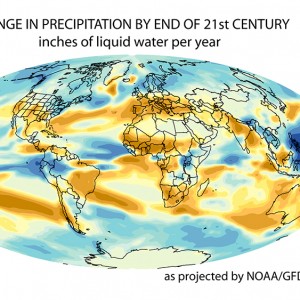The Stream, November 13: Brazil Nears Approval of Diversion Project for Sao Paulo
The Global Rundown |
The United States and China have agreed to landmark cuts in carbon emissions to fight climate change, which is warming groundwater as well as the air and surface water. The U.S. Congress is moving to approve the Keystone XL oil pipeline, documents suggest Shell spilled more oil in the Niger Delta than thought, and Japan is still struggling with water at the Fukushima nuclear plant. Barrick Gold looks to be revamping its stalled Pascua Lama mine in Chile. Brazil is investing millions to bring water to Sao Paulo, and Ireland is protesting household water charges. Urban farms now cover an area the size of Europe.
“It means we are very likely to get an agreement in Paris in December 2015,”—Sir David King, the United Kingdom foreign secretary’s special representative for climate change, on a landmark deal between China and the United States to cut carbon emissions. (Guardian)
By The Numbers |
$275 million Amount Brazil is close to authorizing for a water diversion project to channel water from a river that supplies Rio de Janeiro to reservoirs in Sao Paulo. Bloomberg
6,000 workers Number employed at Japan’s damaged Fukushima nuclear power plant, two to three times more than when it was operating. Most are working to control contaminated water. Associated Press
$350/year Average water bill for a household with two adults and two children in Ireland, where thousands are protesting newly introduced water charges. The New York Times
Science, Studies, And Reports |
Urban farms now cover 456 million hectares, an area the size of the European Union, according to a study released by researchers at the International Water Management Institute. Growing food in cities is expected to improve food security and agriculture’s footprint on resources like land and water. Reuters
The Shell oil company knew about faulty pipelines in the Niger Delta and grossly underestimated the amount of oil spilled through burst pipelines in 2008, according to internal documents. An independent assessment found that as many as 100,000 barrels of oil were spilled, instead of 4,000. Guardian
Warming soil and air temperatures are also leading to warmer groundwater temperatures, researchers from ETH Zurich found. The researchers said the warming could have implications for chemicals and bacteria in the water, as well as geothermal energy. ETH Zurich
On The Radar |
The United States Congress has started moving legislation that would approve the Keystone XL oil pipeline, and could send a measure to President Obama as early as next week. The pipeline would bring oil from Canada’s tar sands to refineries on the Gulf of Mexico and has raised concerns about water pollution in the Ogallala Aquifer. Reuters
More than a year after suspending its Pascua-Lama project in Chile, mining company Barrick Gold has appointed a new project director for the $5 billion mine. One of the director’s top priorities is overseeing the engineering of a water management system, a key stumbling block for environmental approval. Reuters
A news correspondent for Circle of Blue based out of Hawaii. She writes The Stream, Circle of Blue’s daily digest of international water news trends. Her interests include food security, ecology and the Great Lakes.
Contact Codi Kozacek






Leave a Reply
Want to join the discussion?Feel free to contribute!